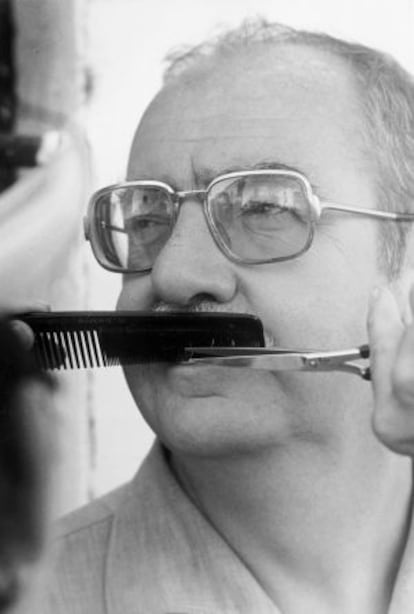Looking in life’s rear-view mirror
José Luis Borau, the retired director of ‘Furtivos,’ is the subject of a new book


José Luis Borau is many things... and also their opposite. He is a filmmaker and a critic. He shoots movies and teaches classes. He goes from making his literary debut at 74 to becoming one of the greatest Spanish authors of the last 30 years. He is not interested in experimental cinema, but has promoted Madrid’s Experimental Film Week.
His friend Bernardo Sánchez Salas notes even more contrasts about the 83-year-old director, writer, producer, publisher, festival organizer and member of the Royal Spanish Academy, now retired due to ill health. “He is Spanish and foreign. He is a giant and fragile at the same time. Borau is always on both sides. He belongs to a generation of individuals who create many individuals inside them, who live in a country with so much duplicity that they need to construct a multitude of masks to survive.”
Sánchez Salas is the latest scholar to examine Borau’s work, and presented the results this week in his book Borau. La vida no da para más (or, Borau. Life cannot give any more). “He has lived many lives; there are many Boraus,” he says of the man who has also ran the Cinema Academy, the SGAE royalties management agency and sat on the board of the Reina Sofía Museum. “He can pass on what he thinks, but there is probably nobody who can connect with his inner self. He is a thoughtful guy, an only child, who grew up with cinema, someone who has been compelled to make his own films since he was a boy.”
The best example is his dabbling in many genres, making something as Spanish as Furtivos (1975) after debuting with a western — Brandy (1964) — and being a fan of the United States, where he filmed Río abajo in 1979: “I like what people hate about Los Angeles,” Borau says of his favorite US city. “As it is like nowhere else, not like New York, because New York is very reminiscent of Europe.”
The book focuses principally on Borau’s work from 1990 onward, but also takes a look at his childhood, in search of the Rosebud that unravels his complex complexity personality. As the book says, “in the basement of his house there are more boxes than the 560 mentioned, there are more boxes than in the storeroom of Xanadu (Borau, by the way, could be Kane and Thompson at the same time; both himself and the person looking for him). There could be thousands of boxes, with everything inside, spread among photos, documents, letters, cuttings, books... which keep washing up on the riverbank that is Borau.”
The filmmaker himself says his life is like a donut with nothing inside, probably to frighten away the creeps. Even so, scratching away at the layers, Sánchez uncovers his passion for Richmal Crompton’s Just William books. “In the English family of William Brown, the boy from Zaragoza recognized — distances and circumstances apart — reflections of his own daily life but opportunely interrupted by William’s incessant mischief. And that’s what produced immense delight, the small and intimate revenge on ‘the world of the adults,’ a world in which he always felt a prisoner,” Sánchez writes.
“I have always carried out whatever mischief came to mind,” Borau admits. He tells, for instance, about his triumph at the roulette wheel at the casino in Pau, France, in 1956. Until panic got the better of him, given that he was traveling without a passport. “That lifestyle scared me a little and I left it. If I had continued down that path, I would have lost everything. Now when I go to a place where there’s a casino I don’t even enter.”
The title “Life cannot give any more” is no augur of bad fortune. Sánchez spoke to Borau over the summer: “His health prevents him from going out or giving interviews,” he says. “And of course he’s sick of it. But the anger keeps him cheerful, it livens him up. Borau’s head is a constantly running engine, and it is growing into a life-giving pain in the neck.”
Tu suscripción se está usando en otro dispositivo
¿Quieres añadir otro usuario a tu suscripción?
Si continúas leyendo en este dispositivo, no se podrá leer en el otro.
FlechaTu suscripción se está usando en otro dispositivo y solo puedes acceder a EL PAÍS desde un dispositivo a la vez.
Si quieres compartir tu cuenta, cambia tu suscripción a la modalidad Premium, así podrás añadir otro usuario. Cada uno accederá con su propia cuenta de email, lo que os permitirá personalizar vuestra experiencia en EL PAÍS.
¿Tienes una suscripción de empresa? Accede aquí para contratar más cuentas.
En el caso de no saber quién está usando tu cuenta, te recomendamos cambiar tu contraseña aquí.
Si decides continuar compartiendo tu cuenta, este mensaje se mostrará en tu dispositivo y en el de la otra persona que está usando tu cuenta de forma indefinida, afectando a tu experiencia de lectura. Puedes consultar aquí los términos y condiciones de la suscripción digital.








































